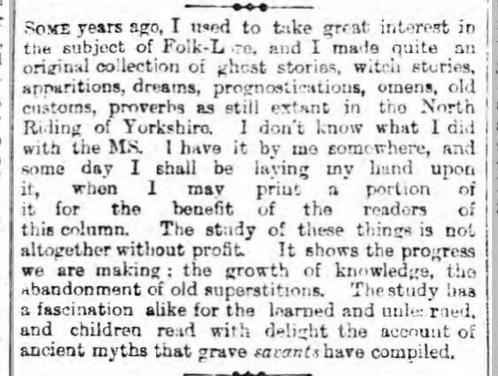Burning Libraries: Lost Yorkshire Folk Collection May 10, 2016
Author: Beach Combing | in : Modern , trackback
Beach has frequently pointed to burning libraries, lost books or in this case lost sheaves of papers. First, let’s introduce the author ‘Ariel’ writing in the Blackburn Standard in 1892. ‘Ariel’ wrote a column for this publication from the late 1880s and then right through the 1890s apparently ending in 1900: normally termed ‘Passing Notes and Gossip’. He was a tireless busybody with an opinion on everything. In the column quoted here he discussed socialism, American conservatism, the importance of the Sabbath, local bankruptcy, children’s books, stock options, a carpet bagger Unionist and two local religious conferences… The first reaction of the outsider reading this column after a hundred odd years will be that the editor was a little bit too generous in terms of space. In any case, on to the lost file:
Some years ago I used to take great interest in the subject of Folk-Lore, and I made quite an original collection of ghost stories, witch stories, apparitions, dreams, prognostications, omens, old customs, proverbs as still extant in the North Riding of the Yorkshire. I don’t know what I did with the MS. I have it by me somewhere, and some day I shall be laying my hand upon it, when I may print a portion of it for the benefit of the readers of this column. The study of these things is not altogether without profit. It shows the progress we are making; the growth of knowledge, the abandonment of old superstitions. The study has a fascination alike for the learned and unlearned and children read with delight the account of ancient myths that grave savants have compiled….
Ariel, then, goes on to quote an author (he does not name).
In the phrases, sayings, and ‘traditions of the elders’ we often hear, as it were, the coming and going of successive races, and get glimpses of beliefs which once moved the ruling spirits of humanity. Customs, long since extent, take fresh being. The dry bones live again, and the valleys and woods and hills are instinct [?]* once more with the life which possessed them before the Romans saw the land and thought it fair. A rich store of folklore in proverbs, adages, and quaint conceits is hidden away in the old-world villages of the hills, and the store gets poorer as one after another of the fathers of the hamlets pass to the churchyard, ‘each in his narrow cell for ever laid’.
A few thoughts here. Beach has failed to track down Ariel. Local books give no reference, nor does the British Library Catalogue: this is annoying as his identity will have been an open secret in his day. We clearly have someone deeply embedded in Blackburn life, but someone who had had contacts with the North Riding of Yorkshire across the Pennines and who perhaps grew up there? He seems not to have published his work either as a book or in his column, perhaps he realized how strange it would be to put Yorkshire folklore into a newspaper for an industrial Lancashire town: or perhaps he never found that precious sheaf. In any case the final tally is Eternity 1, Posterity 0 and that’s a crappy scoreline.
If anyone can help track Ariel or his collection down (vain hope): drbeachcombing At yahoo DOT com
Source: Ariel, ‘Passing Notes and Gossip’, Blackburn Standard (13 Feb 1892), 8
*Randy writes in, 30 May 2016: ‘You put a question mark after “instinct”… “and the valleys and woods and hills are instinct [?] once more with the life which possessed them” I might be able to provide a bit of enlightenment from my 1938 Webster dictionary, to whit, “instinct (‘stingkt), adj. animated”. Perhaps the “hills are animated once more[?].


